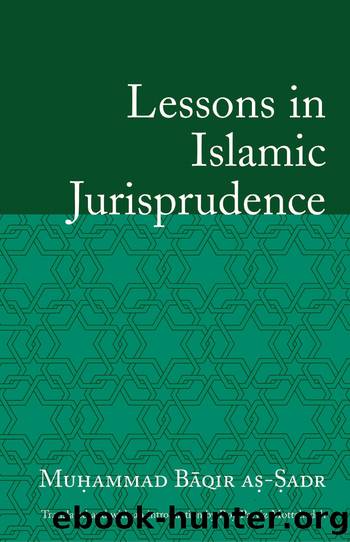Lessons in Islamic Jurisprudence by Mottahedeh Roy; Mottahedeh Roy ;

Author:Mottahedeh, Roy; Mottahedeh, Roy ;
Language: eng
Format: epub
Publisher: Oneworld Publications
The Connected and Independent Context
We have come to understand that the word âconversationâ in the preceding example might be the context for that sequence of words as a whole. It is called a conjunctive context because it is conjoined with the word âsea,â which invalidates the literal meaning when [found] accompanying [the conjunctive context] in a single passage. The word which loses its literal meaning because of the context is called âcontextualized.â
An example of a connected context is an exception from the general, as when the giver of a command says, âRespect every poor person except sinners.â The word âeveryâ lexically has the prima-facie sense of generalization, but the word âsinnersâ is incompatible with this generalization. When we study the sequence of words as a whole we see that the image which this word âsinnersâ entails is closer to [the sense of] the passage than the image of generalization which the word âeveryâ entails. In fact, there is no room for comparison between the two. For this reason the particle of exception [sc., the word âexceptâ] is considered to be the context for the general meaning of the passage. So the conjunctive context is everything that is conjoined with another word and that invalidates the prima-facie sense [of that word] and directs the general meaning of the passage in a direction which is in harmony with itself.
Sometimes it happens that the context with this meaning does not appear connected to the speech in question, but disjunct from it. It is called a disjunctive context. An example is when the giver of a command says âRespect every poor person.â Then s/he says in another conversation a while later, âDo not respect the sinners among the poor.â This prohibitive [verb form], had it been conjoined with the first speech, would be considered a conjunct context; yet it was disjoined from it in this example. In this light we understand the meaning of the jurisprudential rule that says âThe prima-facie sense of the context takes precedence over the prima-facie sense of what is contextualized by it, regardless of whether the context be conjunctive or disjunctive.â
Download
This site does not store any files on its server. We only index and link to content provided by other sites. Please contact the content providers to delete copyright contents if any and email us, we'll remove relevant links or contents immediately.
| Hadith | History |
| Law | Mecca |
| Muhammed | Quran |
| Rituals & Practice | Shi'ism |
| Sufism | Sunnism |
| Theology | Women in Islam |
The History of Jihad: From Muhammad to ISIS by Spencer Robert(2507)
Nine Parts of Desire by Geraldine Brooks(2283)
The Turkish Psychedelic Explosion by Daniel Spicer(2246)
The First Muslim The Story of Muhammad by Lesley Hazleton(2158)
The Essential Rumi by Coleman Barks(1931)
1453 by Roger Crowley(1881)
The Last Mughal by William Dalrymple(1793)
Trickster Travels: A Sixteenth-Century Muslim Between Worlds by Davis Natalie Zemon(1783)
Muhammad: His Life Based on the Earliest Sources by Martin Lings(1569)
by Christianity & Islam(1564)
God by Aslan Reza(1561)
A Concise History of Sunnis and Shi'is by John McHugo(1511)
Magic and Divination in Early Islam by Emilie Savage-Smith;(1456)
No God But God by Reza Aslan(1436)
The Flight of the Intellectuals by Berman Paul(1397)
Art of Betrayal by Gordon Corera(1366)
Nothing to Envy by Barbara Demick(1326)
What the Qur'an Meant by Garry Wills(1322)
Getting Jesus Right: How Muslims Get Jesus and Islam Wrong by James A Beverley & Craig A Evans(1276)
